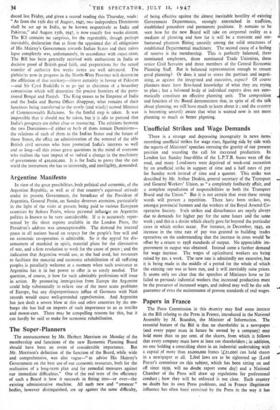The Super-Planners
The announcement by Mr. Herbert Morrison on Monday of the membership and functions of the new Economic Planning Board should have been an event of considerable importance. But Mr. Morrison's definition of the function of the Board, while wide and comprehensive, was also vague—" to advise His Majesty's Government on the best use of our economic resources, both for the realisation of a long-term plan and for remedial measures against our immediate difficulties." One of the real tests of the efficiency of such a Board is how it succeeds in fitting into—or over—the existing administrative machine. All such new and " amateur " bodies, however distinguished, are up against the same difficulty, of being effective against the almost inevitable hostility of existing Government Departments, strongly entrenched in tradition, established procedure and permanent positions. It remains to be seen how far the new Boird will take on corporeal reality as a medium of planning and how far it will be a transient and em- barrassed phantom flitting uneasily among the solid structures of established Departmental machinery. The second cause of a feeling of reserve is the membership. This is perfectly balanced, three nominated employers, three nominated Trade Unionists, three senior Civil Servants and three members of the Central Economic Planning Staff. But is balanced representation enough to ensure good planning? Or does it tend to stress the partisan and negoti- ating, as against the integrated and executive, aspect? Of course planners must have first-hand knowledge of what they are trying to plan ; but a balanced body of individual experts does not auto- matically constitute an effective planning unit. The composition and function of the Board demonstrates that, in spite of all the talk about planning, we still' have much to learn about it ; and the country is becoming uneasily aware that what is wanted now is not more planning so much as better planning.


































 Previous page
Previous page